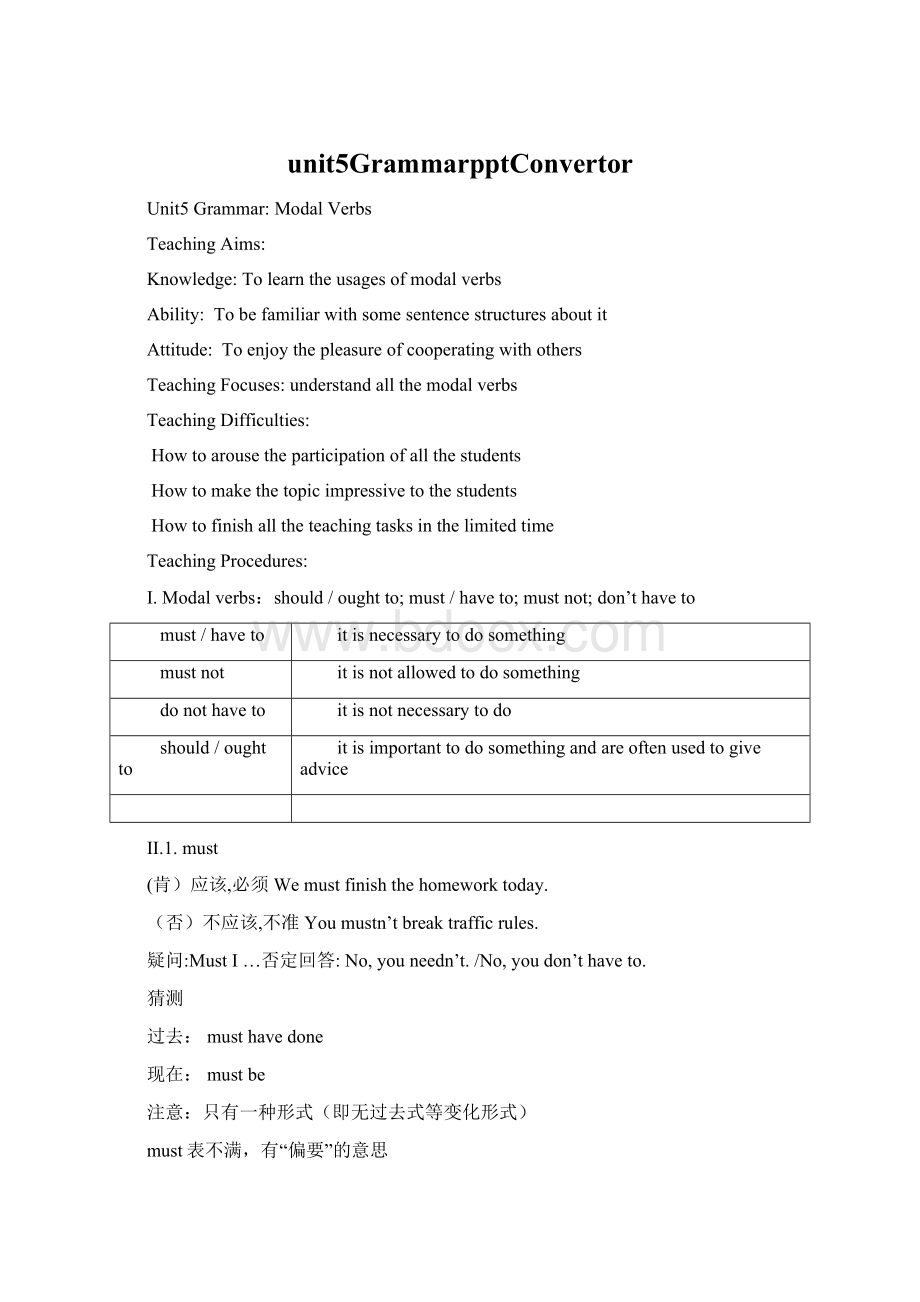unit5GrammarpptConvertor.docx
《unit5GrammarpptConvertor.docx》由会员分享,可在线阅读,更多相关《unit5GrammarpptConvertor.docx(14页珍藏版)》请在冰豆网上搜索。

unit5GrammarpptConvertor
Unit5Grammar:
ModalVerbs
TeachingAims:
Knowledge:
Tolearntheusagesofmodalverbs
Ability:
Tobefamiliarwithsomesentencestructuresaboutit
Attitude:
Toenjoythepleasureofcooperatingwithothers
TeachingFocuses:
understandallthemodalverbs
TeachingDifficulties:
Howtoarousetheparticipationofallthestudents
Howtomakethetopicimpressivetothestudents
Howtofinishalltheteachingtasksinthelimitedtime
TeachingProcedures:
I.Modalverbs:
should/oughtto;must/haveto;mustnot;don’thaveto
must/haveto
itisnecessarytodosomething
mustnot
itisnotallowedtodosomething
donothaveto
itisnotnecessarytodo
should/oughtto
itisimportanttodosomethingandareoftenusedtogiveadvice
II.1.must
(肯)应该,必须Wemustfinishthehomeworktoday.
(否)不应该,不准Youmustn’tbreaktrafficrules.
疑问:
MustI…否定回答:
No,youneedn’t./No,youdon’thaveto.
猜测
过去:
musthavedone
现在:
mustbe
注意:
只有一种形式(即无过去式等变化形式)
must表不满,有“偏要”的意思
ThebellmustringwhenIwasbusyinthekitchen.
Mustyoutalksoloudly?
2.haveto
客观需要(不得不)
有各种时态:
haveto;will/shallhaveto;hadto
don‘t
doesn’thaveto
didn‘t
should与oughtto:
应该
oughtto侧重于某件事在责任、义务上该做。
should表示某件事适宜于做。
Youarehisfather.Yououghttotakecareofhim.义务
Weshouldnotusetoomanybigwordsinoureverydayspeech.
oughtto的句式
否定句:
Yououghtnot(=oughtn't)towritesocarelessly.
疑问句:
Oughtwetogivehimachancetotry?
与完成时连用:
should/oughttohavedonesth.
Weoughttohavefinishedourhomeworkontime.
shouldn't/oughtn'ttohavedonesth.
Theyoughtn'ttohavecomebacksolate.
oughtto表示非常有可能的事。
It ought to be a close game .
It ought to be a fine day tomorrow.(极可能是好天)
Practice:
1Mustwecleanthehousenow?
No,you_A__.
A.needn'tB.maynotC.mustn'tD.can't
2Mustwecometomorrow?
B
A.No,youcan'tB.No,youneedn'tC.No,youmustn'tD.No,youmaynot
3“Where______myumbrella?
”A
“Somebody_______itawaybymistake.”
A)is,musthavetaken B)is,musttake C)havebeen,musttake D)is,takes
4Weoughttohelpeachotherinourwork,__D__?
A)oughttoweB)shouldwe C)shouldn’twe D)oughtn’twe
5We____D____theletteryesterday,butitdidn’tarrive.
A)mustreceive B)oughttoreceive C)musthavereceivedD)oughttohavereceived
表示推测——情态动词的重要用法.
情态动词
对将来
对现在
对过去
肯定的推测must
+V.
常见mustbe
+V.
+bedoing
+havedone
可能的推测may/might
+V.
可以用not表示“可能不”
+V.
+bedoing
可以用not表示“可能不”
+havedone
可以用not表示“可能不”
否定的推测can’t/couldn’t
+V.
+V.
+bedoing
+havedone
疑问的推测can/could
+V.
+V.
+bedoing
+havedone
表示推测——情态动词的重要用法.
1.YoumustbeMr.Smith----Iwastoldtoexpectyouhere.
2.Hemusthaveknownwhatwewanted.
3.Wemayhavereadthesamereport.
4.Hecan’thavesleptthroughallthatnoise.
5.There’ssomeoneoutside----whocanitbe?
6.Whatcantheybedoing?
7.Thesepillsmighthelptocureyourdisease.
8.Youcouldberight,Isuppose.
must+havedone表示对过去已经发生的行为进行推测,意为“想必/准是/一定作了某事”。
1.Wemusthavelearned2,000wordsbytheendoflastterm.
到上学期为止我们一定学了有两千个单词。
2.HemusthavegonetoBeijing.他一定已经去北京了。
can/could+havedone表示对过去的行为的怀疑和不肯定,通常用在否定句和疑问句中。
1.Cantheyhavewonthebasketballmatch?
他们可能赢了篮球赛吗?
2.Itcouldn’thavebeenMr.Green.HehasgonetoBeijing.
那不可能是格林先生的,他已经去北京了。
could(不用can)+havedone,在肯定句中表示“本来能够…而没能…”,具有婉转的批评和责备之意。
Youcouldhavetoldmeearlier.你本可以早点告诉我的。
Inthosecircumstances,wecouldhavedonebetter.在那样的情况下,我们本可以做得更好的.
should/oughtto+havedone用于肯定句时,表示“本该做某事而实际上没做”,用于否定句时,则表示“本不该做的事反而做了”。
1.Youshouldhavetoldhimaweekago.你本来应该在一周前告诉他的。
2.Theplantisdead.Ishouldhavegivenitmorewater.
这棵植物枯死了.我本应该给它浇更多水的.
needn’t+havedone表示做了本来不必去做的事。
1.Sheneedn’thavegonetothestationyesterday.昨天她本不必到火车站去的.(昨天她去了)
2.Youneedn’thaveboughtit.你本可不必买它的。
(你买了)
may/mighthavedone
1)“可能已经…”
2)“本有可能做某事”
Shelooksunhappy.Shemighthavegotintotrouble,hasn’tshe?
她看上去不高兴,她可能已经遇上麻烦了,难道不是吗?
(表猜测)
Ifthedriverhadn’tstoppedthecar,hemighthaveknockedtheoldmandown,mightn’the?
如果当初司机不刹车,他很可能就将那位老人撞倒了,难道不是吗?
(显然,此处表虚拟)
巩固练习
1.Oh,I’mnotfeelingwellinthestomach.I__B__somuchfriedchickenjustnow.
A.shouldn’teatB.shouldn’thaveeatenC.mustn’teatD.mustn’thaveeaten
2.---Whyhasn’tJanearrivedyet?
---She__B__againinthemorning.
A.shouldn’thaveoversleptB.mayhaveturnedoffthealarmclock
C.musthavenoonetocallherD.shouldhavesomeonetowakeherup
3.---Didyougotothemoviethedaybeforeyesterday?
----No.We___A____,butwedecidednotto.
A.shouldhavegoneB.couldgoC.shouldgoD.couldhavegone
4.Asitturnedouttobeasmallhouseparty,we__D__soformally.
A.needn’tdressB.didn’thavetodressup
C.mightnothavedressedupD.needn’thavedressedup
5.I’mrathersurprisedyouhaven’treportedhimtoyourteacher.Inmyopinion,you___C___thisassoonasyoufoundouthewascheating.
A.musthavedoneB.mighthavedoneC.shouldhavedoneD.couldhavedone
可兼做行为动词的情态动词:
need、dare
1.作为情态动词用,常用在否定句和疑问句中。
Dare(need)+S+V
S+daren’t(needn’t)+V
Idaren’twalkthroughtheforestatnight.
Dareyouwalkthroughtheforestatnight?
Youneedn’treturnthebooknow.
Needhegoyesterday?
注意对need问句的回答:
----NeedIfinishtheworktoday?
----Yes,_______youmust_________.
No,________youneedn’t________.
No,________youdon’thaveto________.
needn’t对其它情态动词的回答:
----ShallItellJohnaboutit?
----No,you____needn’t(don’thaveto)______.
----Mustwedoitnow?
----No,you____needn’t(don’thaveto)______.
2.作实义动词用,常用在肯定句中,有人称、时态、和数的变化
Heneedstogotherehimself.
Hehasgrownup,sowedon’tneedtoworryabouthim.
3.Sth(sb)need(want,require)+doing/tobedone
Thehouseneedscleaning/tobecleaned
Theboyneedssendingtothehospitalatonce.
句型时态动词
情态动词dare实义动词dare
肯定句
现在时daredodare/darestodo
过去时dareddodaredtodo
否定句
现在时daren’t/darenotdodo/doesnotdare(to)do
过去时darednotdodidnotdare(to)do
疑问句
现在时Darehedo?
Doyou/Doeshedare(to)do?
过去时Daredhedo?
Didhedare(to)do
1.Iwonderhowhe_____D____thattotheteacher.
A.daretosayB.daresayingC.notdaresayD.daredsay
2.Asitturnedouttobeasmallhouseparty,we____D____soformally.
Aneedn’tdressB.didn’thavetodressup
C.mightnothavedressedupD.needn’thavedressedup
Exercises:
1.判断正误:
Howdareyousaysuchathing?
(√)
Howdareyoutosaysuchathing?
(×)
Hedaren’ttospeakEnglishbeforesuchacrowd,didhe?
(×)
Hedaren’tspeakEnglishbeforesuchacrowd,darehe?
(√)
Nobodyneedtobeafraidofcatchingthedisease.(×)
Nobodyneedbeafraidofcatchingthedisease.(√)
Thesedishesneedbecleanedcarefully.(×)
Thesedishesneedtobecleanedcarefully.(√)
Thesedishesneedcleaningcarefully.(√)
在不表示推测的情态动词中,我们要注意以下考点:
1.表示能力、许可的情态动词的用法。
2.表示否定的情态动词的用法。
3.shall和will的多种意义的区别。
4.情态动词短语的使用。
5.虚拟语气中情态动词的使用。
1.表示能力:
can,could,beableto
*beableto能用于各种时态。
can/could只能表示现在或过去的能力。
*was/wereableto:
“设法做成某事”相当于managedtodosth.;succeededindoingsth.。
Eg:
1.Acomputer___A___thinkforitself;itmustbetoldwhattodo.
A.can’tB.couldn’tC.maynotD.mightnot
2.Thefirespreadthroughthehotelveryquicklybuteveryone___D___getout.
A.hadtoB.wouldC.couldD.wasableto
3.Theywill___D___runthismachineontheirowninthreemonths.
A.canB.couldC.mayD.beableto
4.Thatbigcinema___A___seat2,000people.
A.canB.shouldC.oughttoD.isableto
表示许可:
may/might,can/could
*might,could比较委婉,一般多用于疑问句.
*can,may表达的语言比较随便.
*在以could,might表示征询对方意见或表示请求时,回答应相应使用can,may.
5.—CouldIborrowyourdictionary?
—Yes,ofcourseyou____C___.
A.mightB.willC.canD.should
6.—MightIwatchTVaftersupper?
—Yes,you____A____.
A.mayB.mustC.mightD.can
2.表示否定的情态动词的用法:
部分情态动词的否定式是情态动词中的考点之一。
mustn’t不准,禁止
needn’t没必要(=don’thaveto)
can’t不能;不可能
maynot不可以;可能不
shouldn’t不应该(=oughtnotto)
7.You___C___returnthebooknow.Youcankeepittillnextweekifyoulike.
A.can’tB.mustn’tC.needn’tD.maynot
8.Johnny,you___B___playwiththeknife,you______hurtyourself.
A.won’t;can’tB.mustn’t;mayC.shouldn’t;mustD.can’t;shouldn’t
9.----Willyoustayforlunch?
----Sorry,__B___.Mybrotheriscomingtoseeme.
A.Imustn’tB.Ican’tC.Ineedn’tD.Iwon’t
10.----MayIpickaflowerinthegarden?
----____C____.
A.No,youneedn’tB.Not,please.C.No,youmustn’tD.No,youwon’t
3.情态动词:
shall,will的多种意义:
shall/will+动词原形:
*shall可表示命令、警告、承诺、威胁或征询意见.
*will可表示意愿、常出现的动作、在疑问句中表示请求和建议.
*均可表示将来。
过去时为should,would.
shall在句中的含义可分为三类:
1)表示说话人向对方征求意见,多用于第一或第三人称疑问句.
Let’sspendthenightinthetent,shallwe?
Shallhecomein?
2)表示说话者命令、警告或威胁的语气.多用于第二或第三人称.
Youshan’tleavebeforesix.
Nooneshallstopme.
3)表示说话者对将来的承诺.
Allthesethingsshallbeansweredfor.
IpromisethatIshallbuyyouanicebicycleonyourbirthday.
will/would:
1)作为情态动词will有“愿意”的意思,而would也可以用在现在时中,只是语气更婉转客气.
Willyoubemypartner?
Wouldyouliketoeatoutwithme?
Thedoctorhastoldhimtimeandagaintostopsmoking,buthesimplywon’tlisten.
Ituggedatthedoor,butitwouldn’topen.
2)would还有一种特殊用法,表示过去经常会做的事情,多跟在状语从句后.usedto也有类似的意思,但强调现在已停止了该习惯.
Whenhewasthere,hewouldgotothatcoffeeshopatthecornerafterworkeveryday.
Eg:
11.He___shall___bepunishedifhedisobeys.如果他不服从,就要受到惩罚.
12.Wearenotgoingtoquarrelatallifyou__will__onlyletmespeak.
只要你让我说话,我们根本就不会吵架.
13.----Sir,__B__hegoorstay?
----Lethimgo.
A.willB.shallC.mightD.could